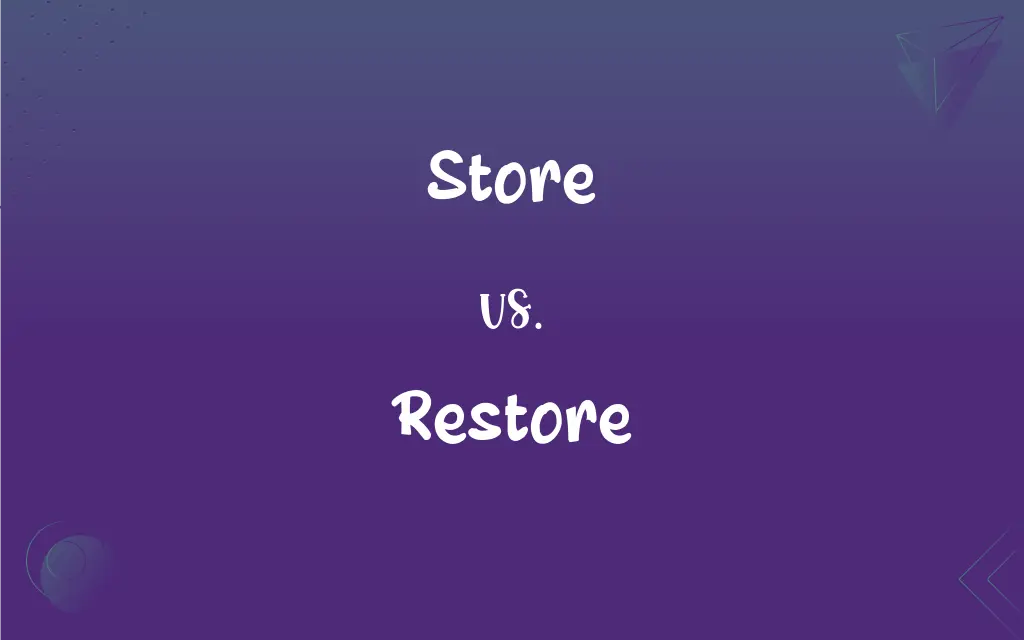Store vs. Restore: What's the Difference?
By Aimie Carlson & Janet White || Updated on March 4, 2024
"Store" involves keeping or placing items in a designated location for future use, emphasizing the act of preservation and organization. "Restore" means to bring something back to its original condition or to reinstate it, focusing on repair.

Key Differences
The term "store" is commonly used to refer to the action of placing or keeping items, data, or information in a specific space or medium so that they can be accessed and used in the future. On the other hand, "restore" implies taking something that has been damaged, degraded, or lost and bringing it back to its original state or condition. Restoration can involve physical objects, such as restoring a piece of art, a building, or an ecosystem, as well as digital data, such as recovering lost files from a backup.
While storing is a proactive measure to prevent loss, damage, or disorganization, restoring is a reactive process that addresses the consequences of these issues after they have occurred. Both concepts are crucial in managing resources effectively, but they serve different purposes and phases in the lifecycle of objects, data, and environments.
In practice, effective storage strategies can minimize the need for restoration by protecting items from harm. However, when damage or loss is unavoidable or has already occurred, restoration efforts become necessary to recover or repair the affected items to their usable or original state.
Comparison Chart
Purpose
To keep or place items for future use.
To bring something back to its original condition.
Focus
Preservation and organization.
Repair, renewal, and recovery.
ADVERTISEMENT
Process
Proactive measure to prevent loss or damage.
Reactive process to address damage or loss.
Application
Physical goods, data, information.
Physical objects, ecosystems, digital data.
Skills Required
Organizational, planning.
Specialized skills in repair, data recovery.
Store and Restore Definitions
Store
Placing food in a refrigerator.
They stored leftovers in the fridge to keep them fresh.
Restore
Renovating a historic building.
The city restored the 19th-century courthouse to its former glory.
ADVERTISEMENT
Store
A place where merchandise is offered for sale; a shop.
Restore
Replanting trees in a deforested area.
The community restored the local forest by planting new trees.
Store
A stock or supply reserved for future use
A squirrel's store of acorns.
Restore
To bring back into existence or use; reestablish
Restore law and order.
Store
Stores Supplies, especially of food, clothing, or arms.
Restore
To bring back to an original or normal condition
Restore a building.
Restored the patient to health.
Store
A place where commodities are kept; a warehouse or storehouse.
Restore
To place in a former position or location
Restored the book to the shelf.
Store
A great quantity or number; an abundance.
Restore
To put (someone) back in a former position or role
Restore the emperor to the throne.
Store
To reserve or put away for future use.
Restore
To make restitution of; give back
Restore the stolen funds.
Store
To fill, supply, or stock.
Restore
(transitive) To reestablish, or bring back into existence.
To restore harmony among those who are at variance
He restored my lost faith in him by doing a good deed.
Store
To deposit or receive in a storehouse or warehouse for safekeeping.
Restore
(transitive) To bring back to good condition from a state of decay or ruin.
Store
(Computers) To copy (data) into memory or onto a storage device, such as a hard disk.
Restore
(transitive) To give or bring back (that which has been lost or taken); to bring back to the owner; to replace.
Store
A place where items may be accumulated or routinely kept.
This building used to be a store for old tires.
Restore
(transitive) To give in place of, or as restitution for.
Store
A supply held in storage.
Restore
To recover (data, etc.) from a backup.
There was a crash last night, and we're still restoring the file system.
Store
(mainly North American) A place where items may be purchased; a shop.
I need to get some milk from the grocery store.
Restore
To bring (a note) back to its original signification.
Store
Memory.
The main store of 1000 36-bit words seemed large at the time.
Restore
(obsolete) To make good; to make amends for.
Store
A great quantity or number; abundance.
Restore
(computing) The act of recovering data or a system from a backup.
We backed up the data successfully, but the restore failed.
Store
A head of store cattle (feeder cattle to be sold to others for finishing); a store cattle beast.
Restore
To bring back to its former state; to bring back from a state of ruin, decay, disease, or the like; to repair; to renew; to recover.
Our fortune restored after the severest afflictions.
And his hand was restored whole as the other.
Store
(transitive) To keep (something) while not in use, generally in a place meant for that purpose.
I'll store these books in the attic.
Restore
To give or bring back, as that which has been lost., or taken away; to bring back to the owner; to replace.
Now therefore restore the man his wife.
Loss of Eden, till one greater manRestore us, and regain the blissful seat.
The father banished virtue shall restore.
Store
Contain.
The cabinets store all the food the mice would like.
Restore
To renew; to reëstablish; as, to restore harmony among those who are variance.
Store
Have the capacity and capability to contain.
They sell boxes that store 24 mason jars.
Restore
To give in place of, or as satisfaction for.
He shall restore five oxen for an ox, and four sheep for a sheep.
Store
To write (something) into memory or registers.
This operation stores the result on the stack.
Restore
To make good; to make amends for.
But if the while I think on thee, dear friend,All losses are restored, and sorrows end.
Store
That which is accumulated, or massed together; a source from which supplies may be drawn; hence, an abundance; a great quantity, or a great number.
The ships are fraught with store of victuals.
With store of ladies, whose bright eyesRain influence, and give the prize.
Restore
To bring back from a state of injury or decay, or from a changed condition; as, to restore a painting, statue, etc.
Store
A place of deposit for goods, esp. for large quantities; a storehouse; a warehouse; a magazine.
Restore
Restoration.
Store
Any place where goods are sold, whether by wholesale or retail; a shop.
Restore
Return to its original or usable and functioning condition;
Restore the forest to its original pristine condition
Store
Articles, especially of food, accumulated for some specific object; supplies, as of provisions, arms, ammunition, and the like; as, the stores of an army, of a ship, of a family.
His swine, his horse, his stoor, and his poultry.
In his needy shop a tortoise hung,An alligator stuffed, and other skinsOf ill-shaped fishes; and about his shelvesA beggarly account of empty boxes.
Sulphurous and nitrous foam, . . . Concocted and adjusted, they reducedTo blackest grain, and into store conveyed.
Restore
Return to life; get or give new life or energy;
The week at the spa restored me
Store
Accumulated; hoarded.
Restore
Give or bring back;
Restore the stolen painting to its rightful owner
Store
To collect as a reserved supply; to accumulate; to lay away.
Dora stored what little she could save.
Restore
Restore by replacing a part or putting together what is torn or broken;
She repaired her TV set
Repair my shoes please
Store
To furnish; to supply; to replenish; esp., to stock or furnish against a future time.
Her mind with thousand virtues stored.
Wise Plato said the world with men was stored.
Having stored a pond of four acres with carps, tench, and other fish.
Restore
Bring back into original existence, use, function, or position;
Restore law and order
Reestablish peace in the region
Restore the emperor to the throne
Store
To deposit in a store, warehouse, or other building, for preservation; to warehouse; as, to store goods.
Restore
Refinishing an antique piece of furniture.
The carpenter restored the old chair to its original beauty.
Store
A mercantile establishment for the retail sale of goods or services;
He bought it at a shop on Cape Cod
Restore
Recovering lost digital files from a backup.
She restored her deleted report from last night's backup.
Store
A supply of something available for future use;
He brought back a large store of Cuban cigars
Restore
Returning a disturbed habitat to its natural state.
Conservationists restored the wetlands to support wildlife.
Store
An electronic memory device;
A memory and the CPU form the central part of a computer to which peripherals are attached
Store
A depository for goods;
Storehouses were built close to the docks
Store
Keep or lay aside for future use;
Store grain for the winter
The bear stores fat for the period of hibernation when he doesn't eat
Store
Find a place for and put away for storage;
Where should we stow the vegetables?
I couldn't store all the books in the attic so I sold some
Store
Keeping books on a shelf for future reading.
She stored her favorite novels in a bookcase for easy access.
Store
Saving digital photos on a hard drive.
He stored thousands of vacation photos on an external drive.
Store
Archiving documents in a filing cabinet.
The office stored all client files in a secure cabinet.
Store
Keeping supplies in a warehouse.
The company stored excess inventory in a central warehouse.
FAQs
What is the main difference between store and restore?
"Store" is about keeping items safe for future use, while "restore" involves repairing or returning something to its original state.
How does storing help in the restoration process?
Proper storage can protect items from damage, making restoration easier or unnecessary by preserving their original condition.
Is restoration always possible?
Restoration is often possible but depends on the extent of damage and the availability of restoration skills or technology.
What skills are needed for effective storage and restoration?
Effective storage requires organizational and planning skills, while restoration requires specialized knowledge in repair or recovery techniques.
Can physical objects only be restored to their original state?
Physical objects can often be restored to their original state, but sometimes they are restored to a condition that approximates the original as closely as possible.
What preventive measures can be taken to reduce the need for restoration?
Preventive measures include proper storage, regular maintenance, using protective coverings or enclosures, and adhering to best practices for care and handling to minimize wear and damage.
Can digital data be both stored and restored?
Yes, digital data can be stored on various media for future use and restored from backups if lost or damaged.
What challenges are associated with storing physical goods?
Challenges include managing space, ensuring proper conditions to prevent damage, and organizing goods for easy access.
How does the cost of storing compare to the cost of restoring?
Generally, the cost of storing items properly is lower than the cost of restoring them after damage has occurred, emphasizing the value of preventive care.
What is the environmental impact of restoration projects?
Restoration projects, especially ecological restorations, can have positive environmental impacts by enhancing biodiversity, improving habitats, and stabilizing ecosystems. However, they must be carefully managed to avoid unintended consequences.
How do professionals determine whether an item is worth restoring?
Professionals evaluate an item's historical, monetary, and sentimental value, the extent of damage, and the feasibility of restoration to determine if it is worth restoring.
What role does technology play in storing and restoring digital data?
Technology is crucial for both processes, with storage solutions like cloud services for keeping data and software tools for recovering lost or damaged files.
How can individuals learn restoration skills?
Individuals can learn restoration skills through specialized courses, workshops, apprenticeships, and practice, depending on the type of restoration (e.g., art, furniture, digital data).
Can all types of data be restored once lost?
Not all data can be restored once lost, especially if there are no backups or if the data is corrupted beyond recovery; hence, the importance of regular backups.
Are there any environmental considerations in the restoration of ecosystems?
Yes, restoring ecosystems involves careful planning to ensure that native species are supported and that the restoration contributes positively to the local environment.
What are common mistakes made during the storage of goods?
Common mistakes include using inappropriate storage conditions (temperature, humidity), overcrowding, poor organization, and failing to protect items from pests or environmental hazards.
How do restoration efforts contribute to cultural preservation?
Restoration efforts help preserve cultural heritage by repairing or reconstructing historical artifacts, buildings, and sites, allowing future generations to experience and learn from the past.
How can individuals contribute to the restoration of natural habitats?
Individuals can contribute by participating in local restoration projects, supporting conservation organizations, reducing their environmental footprint, and advocating for policies that protect natural habitats.
Are there ethical considerations in the restoration of historical buildings?
Yes, ethical considerations include preserving the building's historical integrity, using appropriate materials and techniques, and sometimes the impact on the surrounding community.
What advancements in technology have improved the restoration process?
Advancements include digital imaging and 3D printing for artifacts, sophisticated data recovery software for digital files, and environmentally friendly materials and techniques for ecological restoration.
About Author
Written by
Aimie CarlsonAimie Carlson, holding a master's degree in English literature, is a fervent English language enthusiast. She lends her writing talents to Difference Wiki, a prominent website that specializes in comparisons, offering readers insightful analyses that both captivate and inform.
Co-written by
Janet WhiteJanet White has been an esteemed writer and blogger for Difference Wiki. Holding a Master's degree in Science and Medical Journalism from the prestigious Boston University, she has consistently demonstrated her expertise and passion for her field. When she's not immersed in her work, Janet relishes her time exercising, delving into a good book, and cherishing moments with friends and family.































































